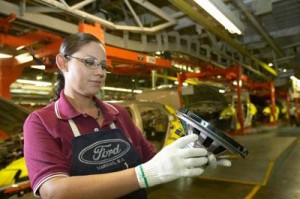INSIDE TUCSON BUSINESS
September 10, 2010
NOGALES, Sonora — Never has a Mexican city had two American cheerleaders like Richard Rubin and Robert Klosek.
The two, principals at Javid de México, will hold their Nogales up to Ciudad Juárez, Agua Prieta, Mexicali or Tijuana. They will explain why Nogales is superior to all of them and will always be.
Among their claims: The city is navigable and waits to enter the United States in a car are minimal. There is a large, talented and stable labor pool from which to choose. Managements and non-union labor forces get along better than elsewhere. The city is still a “community – and the kind of place where any problem can be resolved with a phone call and a visit,” said Klosek, the company´s president.
It is hard to argue with either, for the two today oversee the operations of 21 companies and 1,600 employees, up several hundred employees from when the economic recession in the United States took hold two years ago. Moreover, corporate inquiries about relocation to Mexico are coming at a rate that indicates that 2011 is going to be even better.
The maquiladora, or twin-plant concept, is a 40-year-old program that encourages non-Mexican manufacturers to ship labor intensive work to Mexico to take advantage of lower wages. Initially, the work was largely non-technical, such as sewing and assembly, but it has changed dramatically and now demands workers with considerable entry-level skills or who will require in-house training to meet standards.
But, many companies, instead of setting up Mexican subsidiaries and assuming administrative costs, opt for a “shelter” company, such as Javid, which provides a workforce and on-site management. The shelter, at a slightly higher cost per man hour, allows the foreign company to avoid the legal exposure inherent in a foreign subsidiary.
The maquiladora industry is growing once again because China, to whom Mexico lost tens of thousands of jobs, has lost some of its luster. A recent study shows rising wages, a drop in quality control and higher shipping costs have returned Mexico to favor when it comes to offshore assembly, said Rubin, the chief executive officer. Automotive, aerospace and medical sectors of the economy are all doing well, he said. “Ninety percent of them are in a growth mode. The one area of the economy that´s still weak: Anything related to construction.”
The number of workers employed by maquiladoras in Nogales is estimated at about 25,000, still slightly below its pre-recession level but up considerably in the past year. Javid, one of the smaller players in the shelter business, is dwarfed by Offshore International, which employs some 13,000 workers in Empalme, Sonora. It is also considerably smaller than cross-town competitor Collectron Inc., the oldest shelter in Sonora.
Copyright © 2010 Inside Tucson Business





